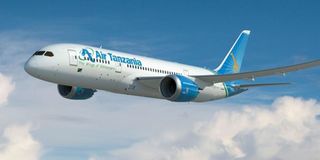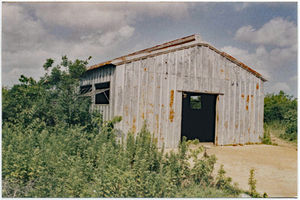Air Tanzania eyes Dar-London, more long-haul routes

One of the Air Tanzania planes flies. Long-haul flights business promises profit in the near future. PHOTO | FILE
What you need to know:
- The national carrier is using its two Boeing 787-8 Dreamliners to operate three weekly flights to and from India and one to and from China
Dar es Salaam. With the global aviation recovering from the Covid-19 scars, Air Tanzania Company Limited (ATCL) is eying further long-haul expansion.
However, this would make economic sense if the company puts in place a smart strategy that will make intercontinental flights economically viable, analysts say.
ATCL gears up to launch a direct flight to London next year as its third non-stop intercontinental flight, according to the airline’s managing director, Mr Ladislaus Matindi.
Currently, the national carrier is using its two Boeing 787-8 Dreamliners to operate three weekly flights to and from India and one to and from China. It carries an average of 190 passengers for India route and 120 for China route on the monthly basis, according to Mr Matindi.
To what it could be described as the route is promising, Mr Matindi said they were planning to add one more frequency to its India route by the end of the year.
However, things were different for the China route, with the ATCL boss saying due to Covid-19 restrictions in China, they were allowed to operate at only 75 percent of their capacity. The airline’s just mention of UK service comes about two years since it lost its slot at London Gatwick due to some legal issues, Covid-19 and delay in receiving big equipment meant for long-haul routes.
In 2019, ATCL secured slots at London Gatwick and was reportedly to begin a three- time weekly Dar es Salaam-Kilimanjaro-London service.
“Following the loss of our slot at Gatwick in 2020, we have started afresh the process to secure the same and talks with the UK authorities are going on well,” Mr Matindi told The Citizen.
If all goes according to plan, ATCL will be the only airline in the country to have a direct flight to and from London, a trip which takes seven to eight hours.
Presently, before jetting off to London, passengers from Tanzania have to sit through major layovers at other airports like Jomo Kenyatta, Kigali, Addis Ababa, Dubai, Doha, Istanbul, and Amsterdam. This suggests that the entrant of ATCL in the new market is set to intensify the battle for customers with Kenya Airways, RwandaAir, Ethiopian Airlines, Flydubai, Emirates, Qatar Airways, Turkish Airlines and KLM.
Aviation stakeholders believe the national carrier could stand a chance to beat their competitors given that nonstop flight is worth more to customers than connecting air services.
However, they believe for ATCL to emerge the winner of the battle, it needs to come up with a strategy that will allow interlining and code-share with giant airlines on the globe.
They also suggested for ATCL to invest in market intelligence, enhance world-class services throughout its entire value chain, focus on the cargo segment, regional feeders and cost leadership strategy.
Air transport experts also called on boosting the tourism sector to make Tanzania less dependent on other international airlines to bring tourists. And that is what the government has been doing, with the latest initiatives being the launch of the Royal Tour Film that is meant to aggressively market the country’s tourist attractions.
A renowned aviation expert with decades of experience Juma Fimbo advised ATCL to seek code-share agreement with the British Airways and airlines in India and China where it is currently flying to and from.
With British, China and India markets being tourism and trade-driven and considering the countries’ airlines’ big brand image, code-share will create confidence to tour package operators and traders to come and invest here.
This year’s July arrivals were led by the US (17,135), France (12,634), Britain (8,586), Germany (8,015) and the Netherlands (5,102), according to the National Bureau of Statistics (NBS).
“I am optimistic code-share will attract tour package operators to invest massively in the tourism sector and thus attract more tourists from Europe to Tanzania,” said Mr Fimbo.
Interlining and code-share with the British Airways and other airlines in the UK, for-instance, will also give customers more flight flexibility, allowing them to fly from Heathrow where it has slots, to other areas.
“Considering the fact that ATCL has equipment, I believe other airlines will agree to enter interlining and code-share agreements in favorable conditions,” said Mr Fimbo.
The airline is expecting to receive five aircraft by next year to make a total of its fleets to 16.
Six of the 16 aircraft are three Boeing 787-8 Dreamliners, two Boeing 737-9 aircraft and one Boeing 767-300 Freighter, which are the perfect fit for intercontinental flights.
A renowned aviation expert Gaudence Temu said for intercontinental flights to work, ATCL must provide world-class services throughout its entire value chain as it will be competing with other international carriers.
Schedule reliability for example, he explained, is very critical for the success of an airline as disruption or cancelations tend to put off travelers.
“Of utmost importance, the airline should work closely with all stakeholders such as tour operators and cargo agents to promote destination Tanzania,” opined Mr Temu.
The airline must also focus on the cargo segment as even without having a freighter this can generate good revenue through carrying cargo in the belly of passenger aircraft.
In the process, said Mr Temu, this will support other sectors of the economy such as horticulture, fishing, and mining, among others.
Tanzania Airports Authority (TAA) director general Mussa Mbura said ATCL should allow more slots of cargo in their flights.
“Cargo slots are very important to allow business between the two countries, right now a lot of business people get staff from the UK,” stressed Mr Mbura.
According to booking data, in 2019 London was the Tanzanian city’s largest unserved market inside and outside Africa, a situation that presses a call for capitalisation on the available market.
Kilimanjaro Airports Development Company (Kadco) acting managing director Christine Mwakatobe said direct flights will create much enthusiasm in the tourism market and attract more visitors who would use ATCL.
“Plans for the new route will help ATCL to meet the demands of their customers,” she recounted.
Nas-Dar Airco head of corporate affairs Evans Mlelwa said boosting the tourism sector to make Tanzania less dependent on other international airlines to bring tourists, would make ATCL get more passengers to fly with.
Tanzania Civil Aviation Authority ex- air navigation services director John Chambo said for ATCL to make it, it needed to prepare itself in terms of equipment, customer care and setting a reasonable price.
Aviation expert Jimray Nangawe said ATCL should work on the reasons that made the British Airways consider the direct flight to and from Tanzania unprofitable and thus pack and go nine years back.
“Politics should not be entertained in running ATCL. If we avoid that, ATCL’s flights will be economically viable,” said Mr Nangawe.
For that to happen, ATCL will need to have strong regional feeders, perfect connection with no delays, interlining with other airlines and enough frequencies so that customers should not think about alternative airlines.
Responding to the question of the need for ATCL to embrace interlining and code-share, the ATCL boss said they were more than willing to do so, if other airlines would be ready.
On the issue of regional feeders, he said, that is what they were targeting for them to get more passengers to London.
“That is what we are doing on our India route. Regional feeders account for between 30 and 40 percent of our customers flying to India,” said Mr Matindi.
ATCL’s regional flights include Nairobi (Kenya), Entebbe (Uganda), Bujumbura (Burundi), Zambia, Zimbabwe, DRC and Comoro.
Recently, the airline also disclosed plans to add routes to Ghana, Nigeria, and the Democratic Republic of the Congo, in part to help with the nation’s economic development.





